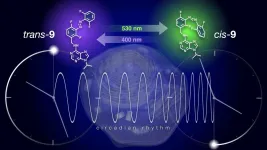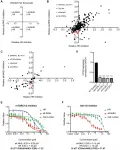INFORMATION:
Scientists sound alarm about unprecedented mercury accumulation in Pacific Ocean trenches
Multi-national team of scientists discover amounts of mercury in the deepest trenches of the Pacific Ocean that exceed any value ever recorded in remote marine sediments - even higher than many areas directly contaminated by industrial releases.
2021-05-26
(Press-News.org) A newly released scientific paper in Nature Publishing's Scientific Reports Journal has revealed unprecedented amounts of highly toxic mercury are deposited in the deepest trenches of the Pacific Ocean.
The study, a multi-national effort involving scientists from Denmark, Canada, Germany and Japan, reports the first-ever direct measurements of mercury deposition into one of the logistically most challenging environments to sample on Earth, and the deepest at eight to 10 kilometers under the sea.
Lead author Professor Hamed Sanei, Director of the Lithospheric Organic Carbon Laboratory (LOC) at the Department of Geoscience, Aarhus University, stated the amount of mercury discovered in this area exceeds any value ever recorded in remote marine sediments, and is even higher than many areas directly contaminated by industrial releases.
"The bad news is that these high mercury levels may be representative of the collective increase in anthropogenic emissions of Hg into our oceans," he said. "But the good news is that ocean trenches act as a permanent dump, and so we can expect the mercury that does end up there will be buried for many millions of years. Plate tectonics will carry these sediments deep into the earth's upper mantle".
"But even as mercury is being removed from the biosphere, it remains quite alarming how much mercury has ended up in the ocean trenches. This may be an indicator of the overall health of our oceans."
Co-author Dr. Peter Outridge, a research scientist with Natural Resources Canada and lead author of the United Nations' Global Mercury Assessment, said: "The results of this research help fulfill a key knowledge gap in the mercury cycle, i.e. the true rate of mercury removal from the global environment into deep-ocean sediments." He added, "We have shown that sediments in the ocean trenches are mercury accumulation 'hotspots', with mercury accumulation rates many times higher than were previously believed to be present."
Co-author Ronnie Glud, Professor and Director of the Hadal Centre at the University of Southern Denmark, who was scientific leader of this multi-national expedition to the ocean trenches, said: "This paper calls for extensive additional sampling of the deep-ocean and in particular hadal trenches to support this preliminary work. Ultimately this will improve the accuracy of environmental mercury models and the management of global mercury pollution."
ELSE PRESS RELEASES FROM THIS DATE:
Memory details fade over time, with only the main gist preserved
2021-05-26
What information is retained in a memory over time, and which parts get lost? These questions have led to many scientific theories over the years, and now a team of researchers at the Universities of Glasgow and Birmingham have been able to provide some answers.
Their new study, which is published today in Nature Communications, demonstrates that our memories become less vibrant and detailed over time, with only the central gist eventually preserved. Moreover, this 'gistification' of our memories is boosted when we frequently recall our recent experiences.
The work could have implications in a number of areas, including the nature of memories in post-traumatic stress disorder, the repeated questioning ...
Resetting the biological clock by flipping a switch
2021-05-26
The biological clock is present in almost all cells of an organism. As more and more evidence emerges that clocks in certain organs could be out of sync, there is a need to investigate and reset these clocks locally. Scientists from the Netherlands and Japan introduced a light-controlled on/off switch to a kinase inhibitor, which affects clock function. This gives them control of the biological clock in cultured cells and explanted tissue. They published their results on 26 May in Nature Communications.
Life on Earth has evolved under a 24-hour cycle; of light and dark, hot and cold. 'As a result, our cells are synchronized to these 24-hour oscillations,' says Wiktor Szymanski, Professor of Radiological Chemistry at the University ...
Higher incidence of carpal tunnel syndrome after bilateral oophorectomy
2021-05-26
CLEVELAND, Ohio (May 26, 2021)--Carpal tunnel syndrome (CTS), which causes tingling and numbness in the hand, more commonly affects women than men and tends to peak around the age of menopause. A new study suggests the risk of severe CTS increases in women who underwent bilateral oophorectomy before menopause, and estrogen therapy didn't provide a protective effect. Study results are published online today in Menopause, the journal of The North American Menopause Society (NAMS).
Carpal tunnel syndrome is the most common nerve disorder in the upper body. Although predominately idiopathic in nature, an association with sex hormones has been suggested because of a higher incidence in women ...
Oncotarget: Creation of a new class of radiosensitizers for glioblastoma
2021-05-26
Oncotarget published "Creation of a new class of radiosensitizers for glioblastoma based on the mibefradil pharmacophore" which reported that this group previously identified a calcium channel blocker, mibefradil, as a potential GBM radiosensitizer. They discovered that mibefradil selectively inhibits a key DNA repair pathway, alternative non-homologous end joining.
Then, they initiated a phase I clinical trial that revealed promising initial efficacy of mibefradil, but further development was hampered by dose-limiting toxicities, including CCB-related cardiotoxicity, off-target hERG channel and cytochrome P450 enzymes interactions.
Here, the authors show that mibefradil inhibits ...
Even among the insured, cost may delay follow up care for cancer survivors
2021-05-26
Even among a large group of cancer survivors who were mostly insured, college educated and had annual incomes above the national average, up to 10% delayed care in the previous 12 months because they simply could not afford out of pocket expenses like copays and deductibles, investigators report.
Being unable to get time off from work and being "nervous" about seeing a health care provider, were among the other frequently cited reasons for not always getting timely survivorship care, investigators at the Medical College of Georgia and Georgia Cancer Center report in the journal Cancer Medicine.
Investigators analyzed data from 5,426 cancer survivors who volunteered to share their information with the National Institutes of Health's All of Us Research Program, a historic effort ...
Older Canadians say they're more willing to get the flu shot in the wake of COVID-19
2021-05-26
The pandemic has increased older adults' willingness to receive the flu shot, new research shows.
The study analyzed survey results of 4,501 Canadians over the age of 50 from ten provinces.
Twenty per cent of 1,001 research participants aged 50 to 64 indicated they had not considered getting a flu shot, but were now more likely to given the impact of COVID-19. Of these respondents, 92 per cent inducated that they had not been vaccinated against influenza the year before.
Of the 3,500 participants aged 65 and older, eight per cent reported that they had not originally planned to get a flu shot but were now more likely to receive it.
"The pandemic has been ...
Conserving and monitoring genetic diversity will benefit nature and society
2021-05-26
A hidden planetary crisis has long been neglected that is as serious as the disappearance of species and degradation of habitats. Genetic diversity, which reflects the variation in DNA within species and populations and is the key to their capacity to adapt in times of change, is being lost at an alarming rate. According to an article by 28 authors representing 16 countries, the loss of genetic diversity can affect resiliency in the face of environmental change and result in the loss of important services provided to society. Once gone, genetic diversity can take millennia to return. ...
Long COVID places 'huge burden' on survivors' families, new research suggests
2021-05-26
A new study by Cardiff University in collaboration with the University of Hertfordshire has revealed the huge "secondary burden" placed on those closest to people living with Long Covid.
The researchers surveyed more than 700 Covid-19 survivors along with their partners and close relatives to understand for the first time the impact of the disease on families as a whole.
The findings, published today in BMJ Open, suggest family quality of life is being "severely affected" and a major system of support is needed for both survivors - and those closest to them.
Survivors and their families spoke ...
First reported cases of clots in large arteries causing stroke following COVID-19 vaccination
2021-05-26
Clots in the arteries (arterial thrombosis) are the most common cause of stroke (ischaemic stroke) and have been reported in detail for the first time in young adults who received the Oxford-AstraZeneca covid-19 vaccine in a letter from UK stroke specialists published online in Journal of Neurology Neurosurgery & Psychiatry.
While rare cases of blood clots have been reported previously after administration of the Oxford-AstraZeneca covid-19 vaccine, these have affected veins and most specifically veins in the brain (cerebral venous sinuses).
People who have experienced this unusual form of stroke (cerebral venous sinus thrombosis) have also had low platelet ...
Methotrexate users have a reduced immune response to mRNA COVID-19 vaccine
2021-05-26
Up to a third of patients taking methotrexate - a common treatment for immune mediated inflammatory conditions such as rheumatoid arthritis and psoriasis/psoriatic arthritis - failed to achieve an adequate immune response to mRNA COVID-19 vaccines in a small study accepted for publication in the journal Annals of Rheumatic Diseases.
While mRNA COVID-19 vaccines have been shown to produce an effective immune response in over 90% of healthy adults in clinical trials, it is unknown whether the immune response is as robust in patients with immune-mediated inflammatory diseases (IMID) who may also be taking immunomodulatory medications.
The authors assessed the immune response to the mRNA Pfizer-BioNTech COVID-19 vaccine in 82 patients ...
LAST 30 PRESS RELEASES:
Scientists show how to predict world’s deadly scorpion hotspots
ASU researchers to lead AAAS panel on water insecurity in the United States
ASU professor Anne Stone to present at AAAS Conference in Phoenix on ancient origins of modern disease
Proposals for exploring viruses and skin as the next experimental quantum frontiers share US$30,000 science award
ASU researchers showcase scalable tech solutions for older adults living alone with cognitive decline at AAAS 2026
Scientists identify smooth regional trends in fruit fly survival strategies
Antipathy toward snakes? Your parents likely talked you into that at an early age
Sylvester Cancer Tip Sheet for Feb. 2026
Online exposure to medical misinformation concentrated among older adults
Telehealth improves access to genetic services for adult survivors of childhood cancers
Outdated mortality benchmarks risk missing early signs of famine and delay recognizing mass starvation
Newly discovered bacterium converts carbon dioxide into chemicals using electricity
Flipping and reversing mini-proteins could improve disease treatment
Scientists reveal major hidden source of atmospheric nitrogen pollution in fragile lake basin
Biochar emerges as a powerful tool for soil carbon neutrality and climate mitigation
Tiny cell messengers show big promise for safer protein and gene delivery
AMS releases statement regarding the decision to rescind EPA’s 2009 Endangerment Finding
Parents’ alcohol and drug use influences their children’s consumption, research shows
Modular assembly of chiral nitrogen-bridged rings achieved by palladium-catalyzed diastereoselective and enantioselective cascade cyclization reactions
Promoting civic engagement
AMS Science Preview: Hurricane slowdown, school snow days
Deforestation in the Amazon raises the surface temperature by 3 °C during the dry season
Model more accurately maps the impact of frost on corn crops
How did humans develop sharp vision? Lab-grown retinas show likely answer
Sour grapes? Taste, experience of sour foods depends on individual consumer
At AAAS, professor Krystal Tsosie argues the future of science must be Indigenous-led
From the lab to the living room: Decoding Parkinson’s patients movements in the real world
Research advances in porous materials, as highlighted in the 2025 Nobel Prize in Chemistry
Sally C. Morton, executive vice president of ASU Knowledge Enterprise, presents a bold and practical framework for moving research from discovery to real-world impact
Biochemical parameters in patients with diabetic nephropathy versus individuals with diabetes alone, non-diabetic nephropathy, and healthy controls
[Press-News.org] Scientists sound alarm about unprecedented mercury accumulation in Pacific Ocean trenchesMulti-national team of scientists discover amounts of mercury in the deepest trenches of the Pacific Ocean that exceed any value ever recorded in remote marine sediments - even higher than many areas directly contaminated by industrial releases.




